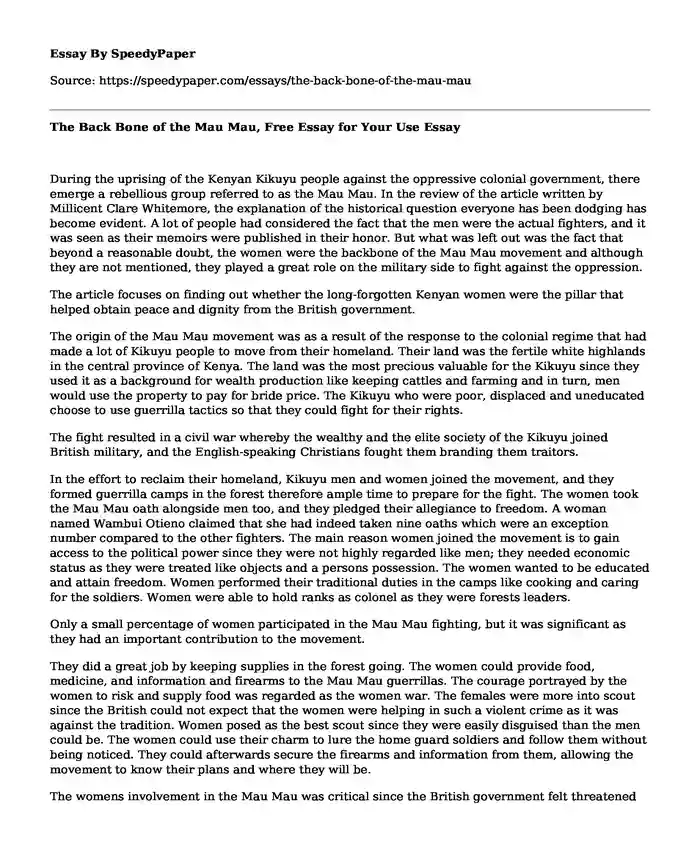During the uprising of the Kenyan Kikuyu people against the oppressive colonial government, there emerge a rebellious group referred to as the Mau Mau. In the review of the article written by Millicent Clare Whitemore, the explanation of the historical question everyone has been dodging has become evident. A lot of people had considered the fact that the men were the actual fighters, and it was seen as their memoirs were published in their honor. But what was left out was the fact that beyond a reasonable doubt, the women were the backbone of the Mau Mau movement and although they are not mentioned, they played a great role on the military side to fight against the oppression.
The article focuses on finding out whether the long-forgotten Kenyan women were the pillar that helped obtain peace and dignity from the British government.
The origin of the Mau Mau movement was as a result of the response to the colonial regime that had made a lot of Kikuyu people to move from their homeland. Their land was the fertile white highlands in the central province of Kenya. The land was the most precious valuable for the Kikuyu since they used it as a background for wealth production like keeping cattles and farming and in turn, men would use the property to pay for bride price. The Kikuyu who were poor, displaced and uneducated choose to use guerrilla tactics so that they could fight for their rights.
The fight resulted in a civil war whereby the wealthy and the elite society of the Kikuyu joined British military, and the English-speaking Christians fought them branding them traitors.
In the effort to reclaim their homeland, Kikuyu men and women joined the movement, and they formed guerrilla camps in the forest therefore ample time to prepare for the fight. The women took the Mau Mau oath alongside men too, and they pledged their allegiance to freedom. A woman named Wambui Otieno claimed that she had indeed taken nine oaths which were an exception number compared to the other fighters. The main reason women joined the movement is to gain access to the political power since they were not highly regarded like men; they needed economic status as they were treated like objects and a persons possession. The women wanted to be educated and attain freedom. Women performed their traditional duties in the camps like cooking and caring for the soldiers. Women were able to hold ranks as colonel as they were forests leaders.
Only a small percentage of women participated in the Mau Mau fighting, but it was significant as they had an important contribution to the movement.
They did a great job by keeping supplies in the forest going. The women could provide food, medicine, and information and firearms to the Mau Mau guerrillas. The courage portrayed by the women to risk and supply food was regarded as the women war. The females were more into scout since the British could not expect that the women were helping in such a violent crime as it was against the tradition. Women posed as the best scout since they were easily disguised than the men could be. The women could use their charm to lure the home guard soldiers and follow them without being noticed. They could afterwards secure the firearms and information from them, allowing the movement to know their plans and where they will be.
The womens involvement in the Mau Mau was critical since the British government felt threatened by it and it forcefully detained the Kikuyu women in large numbers. The women were put under the watch of the home guards and placed in villages. Around the villages, trenches were dug by the women as a punishment to inhibit the Mau from having access to food and information. With the creation of the club known as Maendeleo ya Wanawake which gave a chance to women in putting their role in action and supporting Mau Mau. The subjection of women to rape, violence, and hardship was the sacrifice they made for supporting the movement, and they were compelled to be robust and enduring since the families depended on them. The Mau Mau rebellion was an opportunity for women to prove that they were dedicated to liberating Kenya and the changing of womens roles was a good thing. Women were not curtailed by prejudice, and they acted against all tradition norms to prove their worth therefore they were a pillar of the Mau Mau movement.
Bibliography
Whitemore, Millicent. "The Backbone of the Mau Mau: Female Contribution to the Kenyan Emergency of the 1950's." Report West Point Undergraduate Historical Review 6, no. 1 (2015): 1-13.
Cite this page
The Back Bone of the Mau Mau, Free Essay for Your Use. (2019, Oct 28). Retrieved from https://speedypaper.com/essays/the-back-bone-of-the-mau-mau
Request Removal
If you are the original author of this essay and no longer wish to have it published on the SpeedyPaper website, please click below to request its removal:
- Free Essay Example on US Tax Reform
- Essay Sample on Clinical Documentation System
- Appreciating Life - Essay Example for Students
- The Real Nature of Love Essay Sample
- Free Essay Example: What Is Strategy and Strategic Management
- Free Essay on Drugs and Effects on Body
- Essay Example on Juvenile Mass School Shooters
Popular categories





